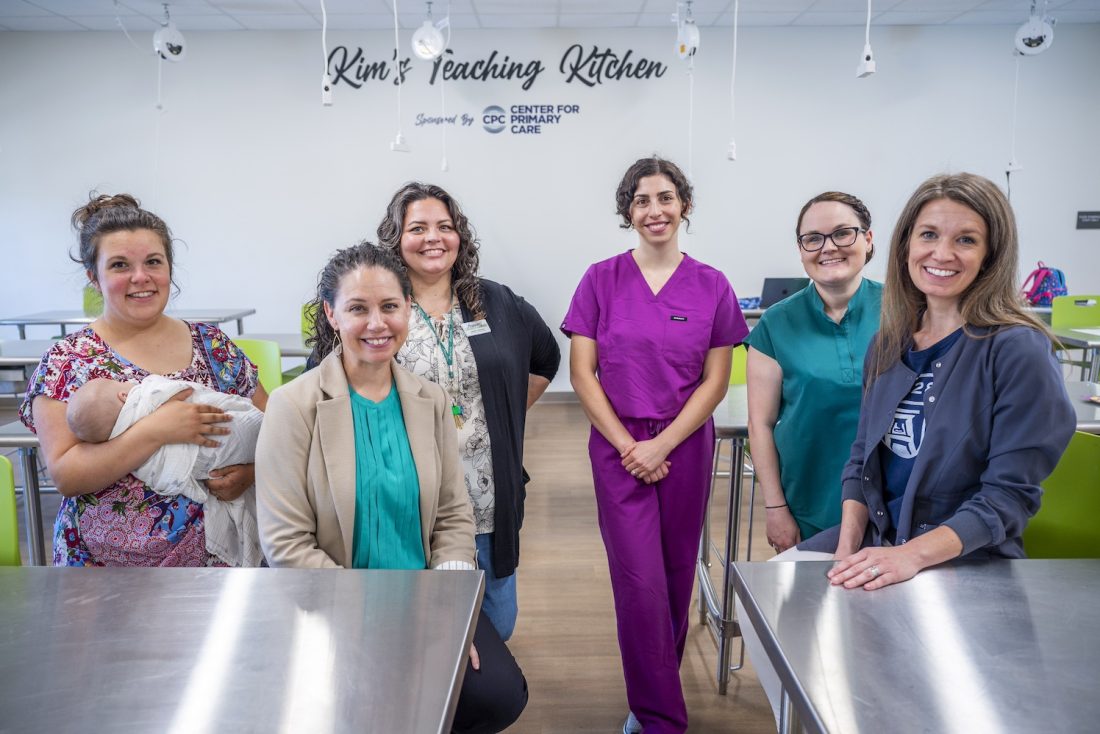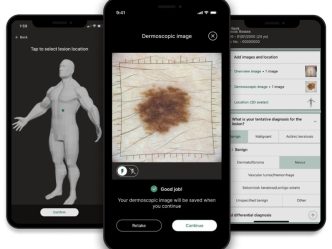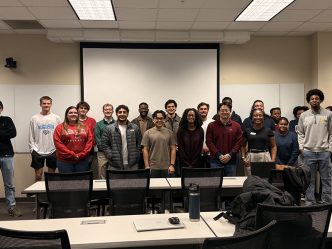LiRhon Chambers vividly recalls the moment she realized something wasn’t right just a week after the birth of her son, Dyllon.
“When we found out I was pregnant, my midwife told me about a program that Augusta University was providing to help moms stay healthy,” Chambers said. “The program monitors your health. They also provide you a scale and a blood pressure pump. Each week, I would log in my blood pressure one or two times a day.”
The program, which began as vidaRPM, or Remote Pregnancy/Postpartum Monitoring, uses a web app that allows doctors and providers to monitor basic vital signs such as blood pressure, gestational diabetes and weight in pregnant patients at Augusta University.
“But, one day, I got a scary phone call,” Chambers said, adding she was headed to daycare to pick up her infant son and young daughter, Makenna.
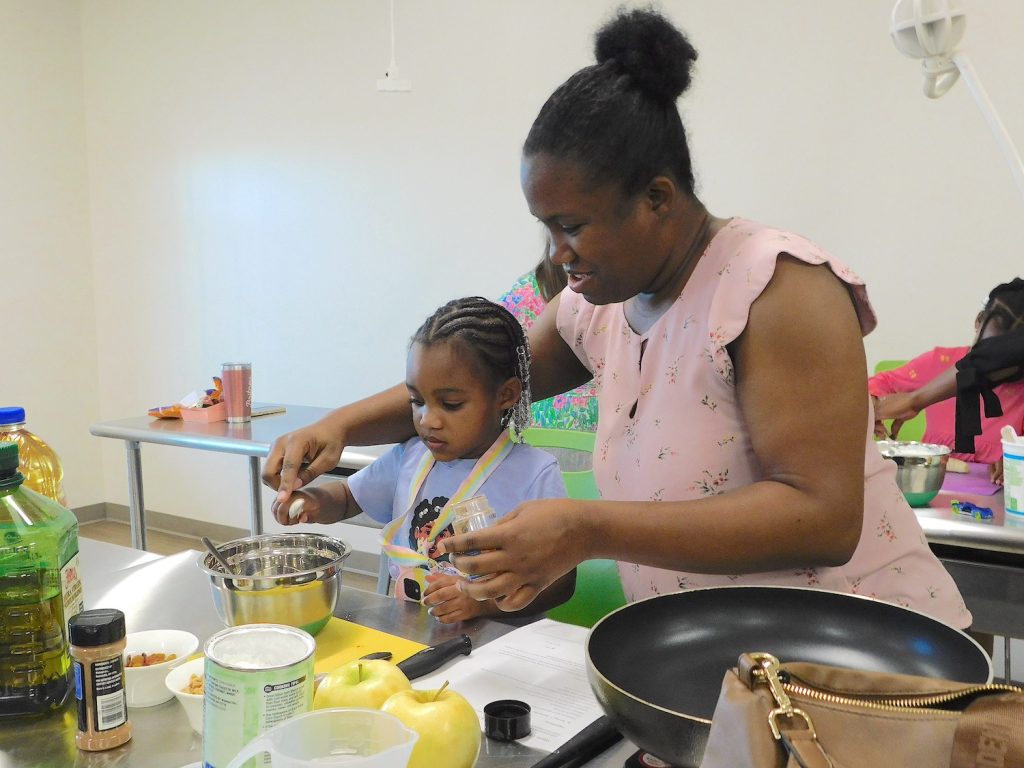
The woman on the other end of the line was Sarah Davenport, a nurse educator for vidaRPM at AU.
“Sarah told me, ‘Your blood pressure is really high. I need you to go get some help,’” Chambers said. “I got really nervous, and I went and got the kids, and then she called me right back. She said, ‘I can hear in your voice that you’re scared. I want you to just remain calm, but you need to get checked out.’”
“I thought I was going to die. If Sarah (Davenport) hadn’t have called me, telling me to get to the ER, I might have. She saved my life.”
LiRhon Chambers, mother enrolled in the vida Maternal Care Model at Augusta University
Chambers drove to the emergency room and learned her blood pressure was “sky high,” she said. She was suffering from postpartum preeclampsia, a potentially life-threatening condition that occurs when you have high blood pressure and excess protein in your urine soon after childbirth.
“It was in the red zone, as we call it,” Chambers said. “I started crying. I thought I was going to die. If Sarah hadn’t have called me, telling me to get to the ER, I might have. She saved my life.”
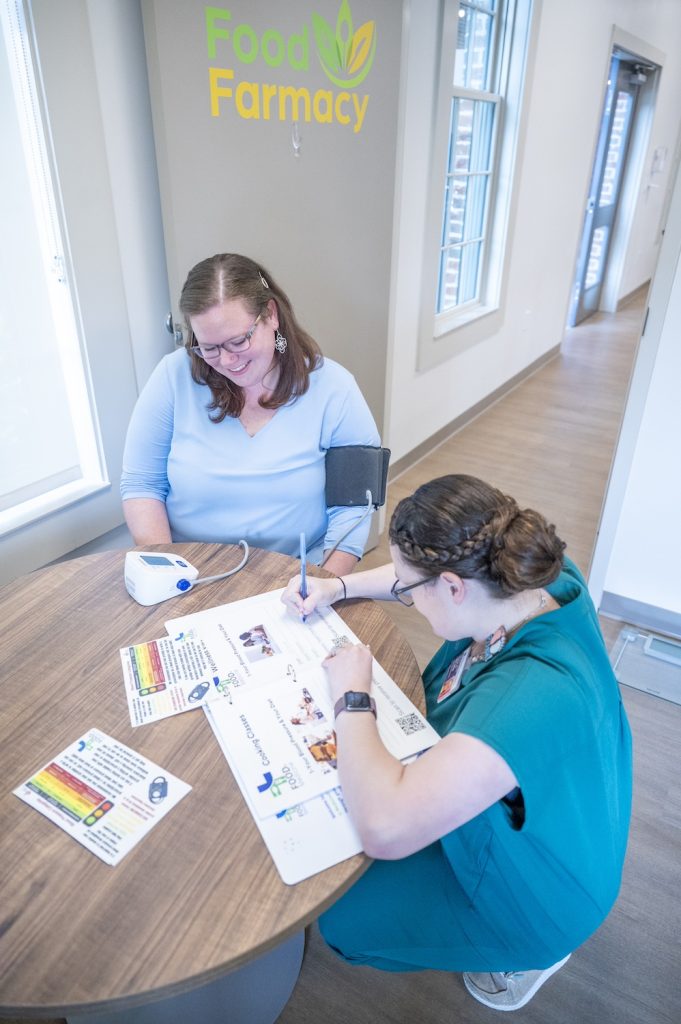
The vidaRPM app was created by Marlo Vernon, PhD, associate professor for the Georgia Prevention Institute at the Medical College of Georgia at Augusta University.
It was inspired by a loved one whose life sadly wasn’t able to be saved, she said.
“I lost my cousin. She was 38 weeks pregnant,” Vernon said. “She woke up after her baby shower with a terrible headache that wouldn’t go away, which is a classic symptom of developing preeclampsia. By the time she got to the hospital, it was too late. They were able to save her baby, but they weren’t able to save her. So having that history in our family, it really inspired me to look for a simple solution to help women.”
As a result, Vernon developed this pregnancy monitoring system so women could easily self-report medical information to their providers.
A holistic care approach
What began as an app has evolved into a pilot program that provides a comprehensive, holistic care approach for women called the vida Maternal Care Model at Augusta University, she said.
“We make sure none of our moms fall through the gaps or any cracks,” Vernon said. “We enroll moms in the second trimester all the way through her six months postpartum. The first thing we do is give her a blood pressure monitor and a scale. We teach her how to self-monitor her blood pressure, how to interpret it, and provide her with an application or an interface to do that. If her blood pressure is above normal thresholds, she gets an alert to repeat her blood pressure. Then, she also gets follow-up questions related to any preeclampsia symptoms.
“We ask, ‘Do you have blurry vision? Are you seeing stars? Do you have a headache that won’t go away? Any unusual pain, unusual swelling or unusual nausea are the five markers,” Vernon added. “If she responds yes to any of those, she gets feedback to contact her provider, particularly if she has high blood pressure.”
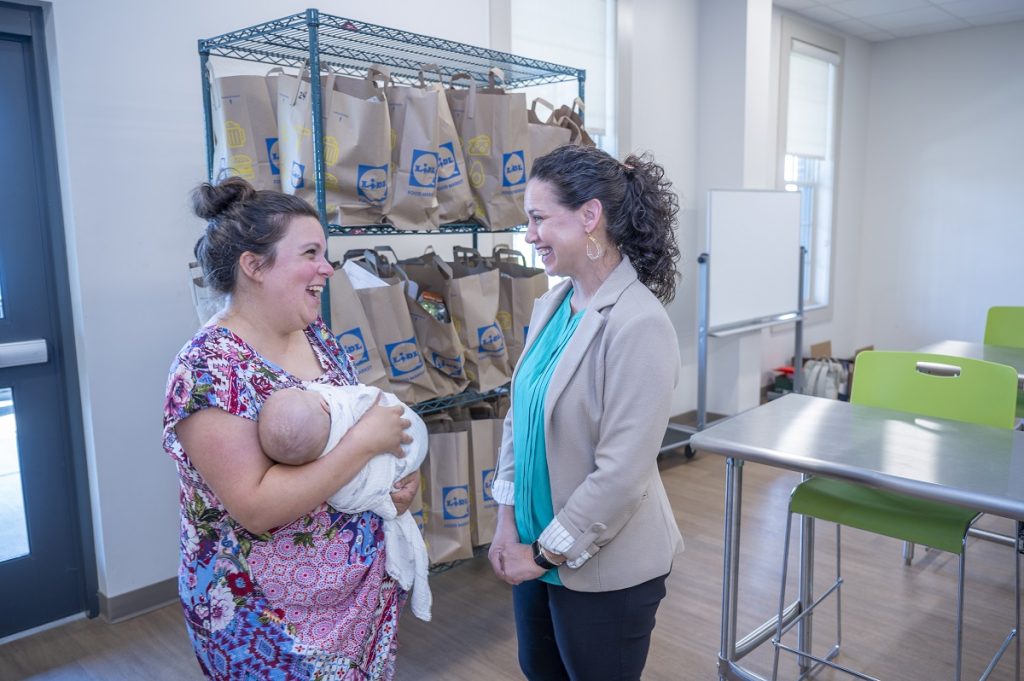
The nurse educator will check the alerts and follow up with mothers to make sure they keep checking their blood pressure, Vernon said.
“We also ask moms to fill out a mental health survey once a week,” Vernon said, who serves on the new Georgia Commission on Maternal and Infant Health. “If she scores a three or higher, which may indicate depressive symptoms, she fills out a longer survey and then gets follow-up feedback to contact her provider and receives online resources including the new personal maternal mental health hotline.”
“We’ve had several moms get admitted for the mental health concerns and get treated,” she added. “That’s been a real win because a lot of women don’t know that they can develop postpartum depression up to one year after birth.”
“We make sure none of our moms fall through the gaps or any cracks. We enroll moms in the second trimester all the way through her six months postpartum.”
Marlo Vernon, PhD, associate professor for the Georgia Prevention Institute at the Medical College of Georgia
More than 300 women have taken advantage of this program at Augusta University, Vernon said. She is hoping this program can help significantly reduce Georgia’s maternal mortality rate in the future.
“We do a satisfaction survey with our moms at six weeks, six months and 12 months now,” Vernon said. “They all really enjoy being in the program. One of the number one factors is they like knowing that someone’s checking up on them. They like having the resource of being able to call Sarah Davenport, our nurse, or Marquetta Thomas, our patient educator.
“Just that relationship piece has been really important,” Vernon added. “And the knowledge that they gain by being in the program is empowering. Now, when they go to their doctor’s appointments, they have questions for their doctor. Before, they may not have even known what to ask.”
The health of mothers and infants across Georgia
Georgia has consistently ranked as one of the most dangerous states in this country to be a new mother.
Over the past two decades, the rate of death of new mothers from pregnancy rose more steeply in Georgia than almost all other states in this country, according to recent data from the Institute for Health Metrics and Evaluation at the University of Washington and Harvard University’s Mass General Brigham.
For the years 2018 to 2021, Georgia had the seventh-highest maternal mortality rate in the nation — around 34 per 100,000 births, according to the Centers for Disease Control and Prevention.
“There is a lack of obstetrics providers within the state and rural women, in particular, suffer that disparity at much higher rates,” Vernon said. “I would like to see the whole model that we’ve developed be available to more moms across Georgia.”
Approximately 84% of maternal deaths cases in the United States were due to preventable causes, according to a recent CDC report.
The most common causes of maternal death include hemorrhage; mental health conditions; cardiomyopathy; cardiovascular or coronary conditions; blood clots; and preeclampsia or eclampsia.
The Georgia General Assembly is working to help combat this problem and improve maternal and child health.

In 2023, state legislators extended Medicaid health insurance coverage for low-income mothers to a full year after giving birth, up from six months. With approximately 54% of all births in Georgia covered by Medicaid, those additional months of coverage are expected to have a huge impact.
Earlier this year, Georgia Gov. Brian P. Kemp also unveiled plans to enhance eligibility for the Georgia Pathways to Coverage program. Georgia Pathways offers health care coverage to residents who meet program requirements and are not otherwise eligible for traditional Medicaid.
“We are not only keeping families healthy together during a critical time of development, but also making an important investment in our state’s future.”
Georgia Gov. Brian Kemp
This proposed addition would provide Medicaid coverage to parents and legal guardians in households with incomes at or below 100% of the Federal Poverty Level who have children ages six and under.
“Since Pathways launched, my administration has worked with our legislative partners, subject experts and stakeholders to evaluate its progress and identify opportunities to streamline and make the program more accessible,” Kemp stated in a recent press release. “As we do in all areas of government, this work will continue, but with today’s announcement we are not only keeping families healthy together during a critical time of development, but also making an important investment in our state’s future.”
This proposal would provide additional coverage for eligible new mothers after their one-year postpartum period expires and would provide previously unavailable coverage to eligible new fathers upon their child’s birth.

“I would like to thank Gov. Kemp as this funding could expand some of Augusta University’s pilot programs that support the health of mothers and their infants which is vital to the future of our state.”
Augusta University President Russell T. Keen
Kemp also announced an additional $2.98 million in funding to expand the Department of Public Health‘s Perinatal Home Visit Pilot Program. This would allow the program to reach an additional 25 counties – expanding its total reach to 75 counties.
The state also plans to dedicate an additional $778,000 to expand cardiovascular and high-risk care services at designated perinatal centers in the state.
“I would like to thank Gov. Kemp as this funding could expand some of Augusta University’s pilot programs that support the health of mothers and their infants which is vital to the future of our state,” said Augusta University President Russell T. Keen.
Healthy hearts in mothers
For the past three years, Chad Ray, MD, professor in MCG’s Department of Obstetrics and Gynecology, has teamed up with AU’s Division of Cardiology to establish a Cardio-Obstetrics program to address some of the serious health issues facing women.
“The Cardio-Obstetrics program allows for our patients who have underlying cardiovascular disease or pregnancy-related cardiovascular disease, like preeclampsia, to provide them specialty care,” said Ray, who served on the Georgia Maternal Mortality Review Committee. “We built this program on an evidence-based approach using data from the Georgia Maternal Mortality Review Committee, asking, ‘How can we have the highest impact on our patient population for preventable morbidity and mortality?’
“The truth is, we have a very high rate of cardiovascular disease in this area,” he added. “In fact, going back almost 15 years now, a cardiology fellow here looked at and published data that would suggest that the Augusta area has some of the highest peripartum cardiomyopathy rates in the country.”
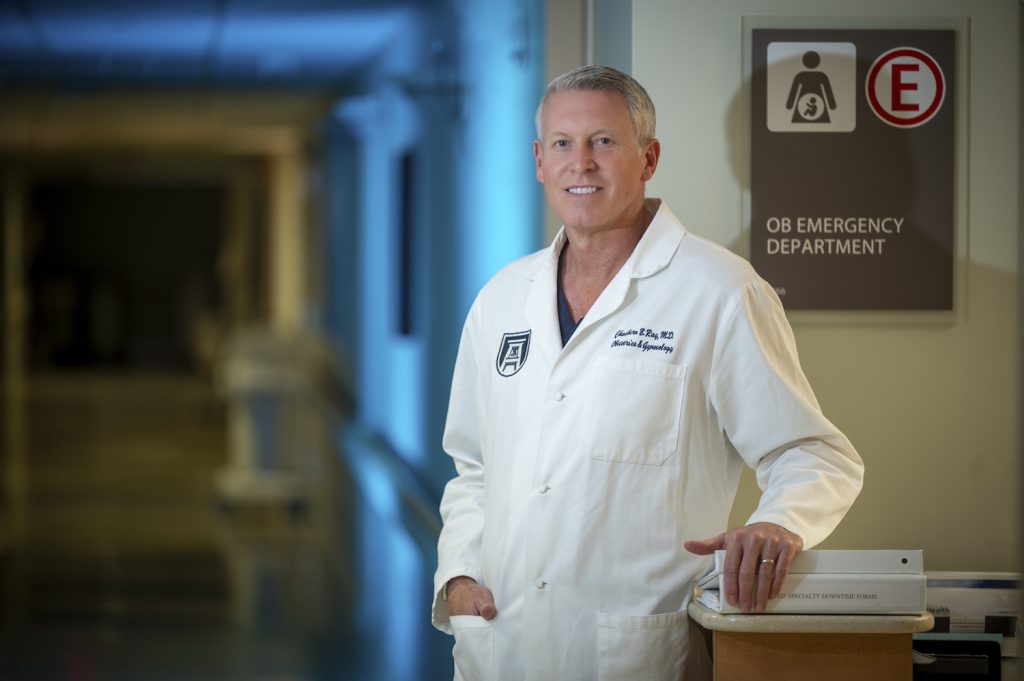
Peripartum cardiomyopathy, also known as postpartum cardiomyopathy, is a form of heart failure that happens towards the end of pregnancy, he said.
“And as a perinatal center, we get transferring patients from all across the region in an area that has very limited access because of the labor and delivery closures,” Ray said. “We have the fewest number of hospitals in any region in the state that would be delivering hospitals. So, with this program, we took the approach to say that we’re going to ultimately try to affect a very vulnerable population and improve health equity as they’re improving their access to specialty care.”
“The Cardio-Obstetrics program allows for our patients who have underlying cardiovascular disease or pregnancy-related cardiovascular disease, like preeclampsia, to provide them specialty care.”
Chad Ray, MD, professor in the Medical College of Georgia’s Department of Obstetrics and Gynecology
When the state extended Medicaid health insurance coverage for low-income mothers to a full year after giving birth, that was a game changer, Ray said.
“The Georgia Legislature did the most important work here because they passed the Medicaid waiver for pregnant patients to extend Medicaid for 12 months postpartum, which really allowed for this program, because those patients became funded patients,” Ray said. “So, whatever model we built here, the expectation would be we can take that model and make it transferable to anywhere in the state.”
In the first three years of the program, Ray said they’ve seen more than 1,000 patients come through the clinic.
“As a result, we are seeing fewer events, especially related to peripartum cardiomyopathy,” Ray said. “Patients are also having much fewer hospitalizations and readmissions. And if they do get hospitalized, the hospitalization is shorter, because we are able to engage them at home. It’s providing not only a huge benefit for the outcomes, which is the point, but it’s also having the intended consequences of less time in the hospital, less time out of their home and certainly less health care dollars. I think the program is doing all the things that we wanted it to do.
“I’m very hopeful that this program will be transferable across the state,” he added. “Our early data shows that it’s making a huge difference.”
Food is Medicine
As part of AU’s holistic approach to improving maternal and fetal health, Vernon and Ray teamed up with Augusta Locally Grown at the Hub for Community Innovation Augusta last semester to provide mothers and expectant mothers with not only fresh produce, but also other healthy activities, such as meeting with nutritionists, free in-person cooking classes and more.
Women who have any chronic or underlying health condition, including food insecurity, were invited to enroll in the Food is Medicine program. They receive an educational workbook and complete weekly and monthly tasks.
Upon completion of those tasks, they were “prescribed” locally-grown fruits and vegetables free of charge to help with their and their family’s eating habits, Vernon said.
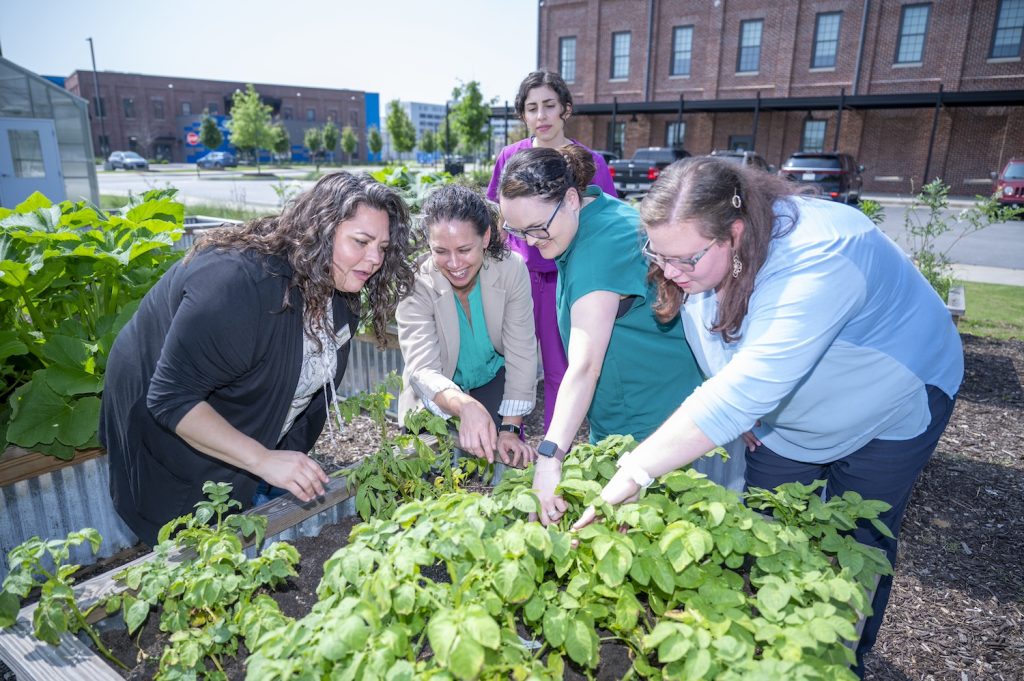
Augusta University has also partnered with Golden Harvest Food Bank and the Department of Public Health to hold weekly screenings for SNAP and WIC benefits. If they qualify, mothers can receive those benefits, as well, she said.
“There are a lot of services that moms aren’t aware of that they are eligible for. In this comprehensive program, we make sure that the mom is connected to her primary care doctor, and she gets an appointment within that first year postpartum.”
Marlo Vernon, PhD, associate professor for the Georgia Prevention Institute at the Medical College of Georgia
Vernon and her team also have a newly started food pantry called Nourishing Clinic in the Cardio-Obstetrics clinic in collaboration with Golden Harvest. This pantry will be providing a box of shelf stable food items to women who report food insecurity, she said.
“There are a lot of services that moms aren’t aware of that they are eligible for,” Vernon said. “In this comprehensive program, we make sure that the mom is connected to her primary care doctor, and she gets an appointment within that first year postpartum. Then, if she needs any specialty care like cardiology, endocrinology or mental health follow-ups, we make sure she is connected to the specialists and gets the care she needs.”
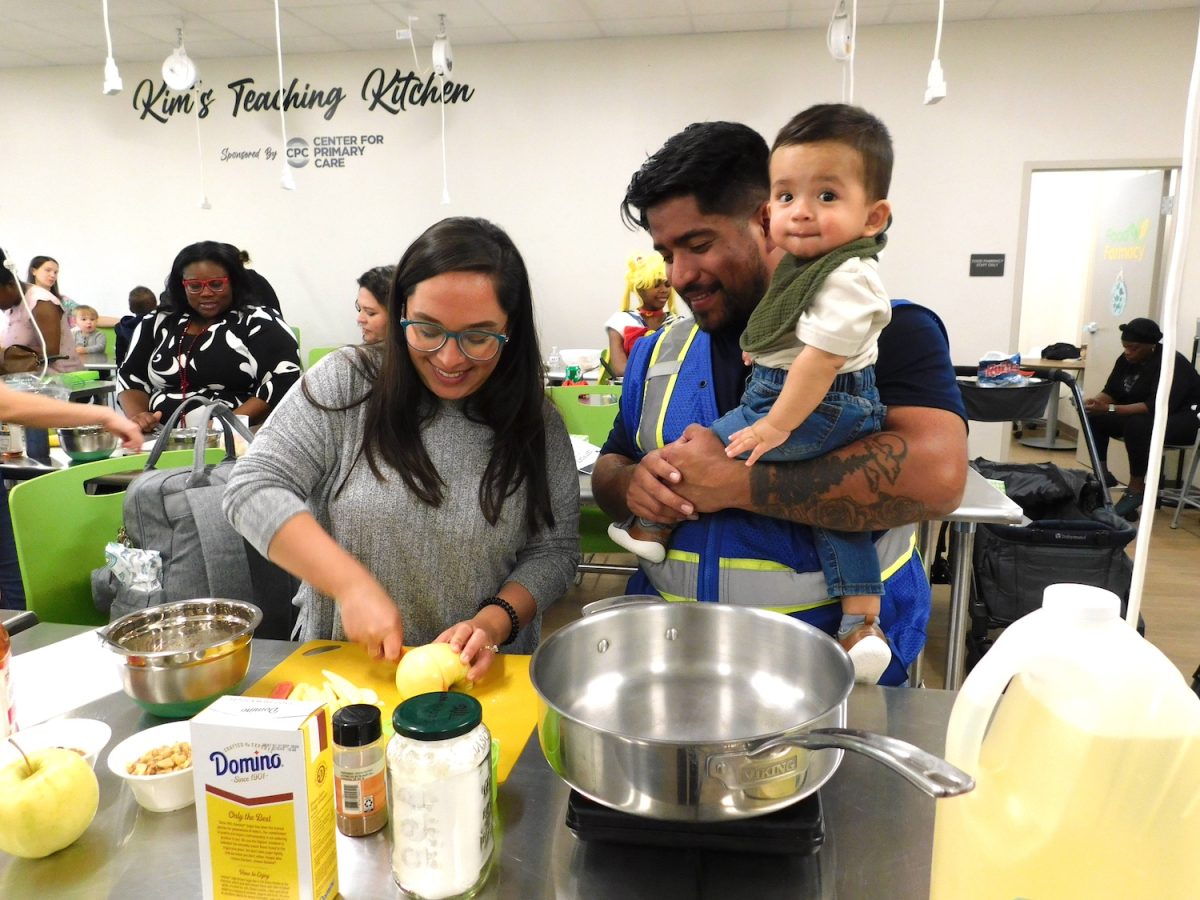
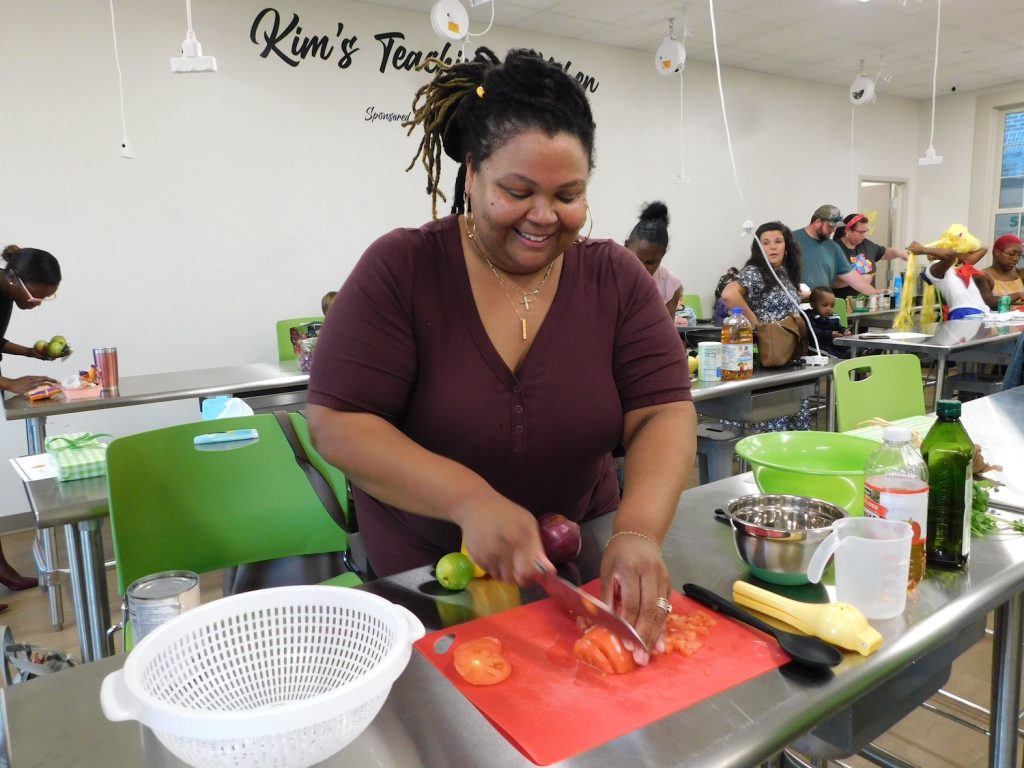
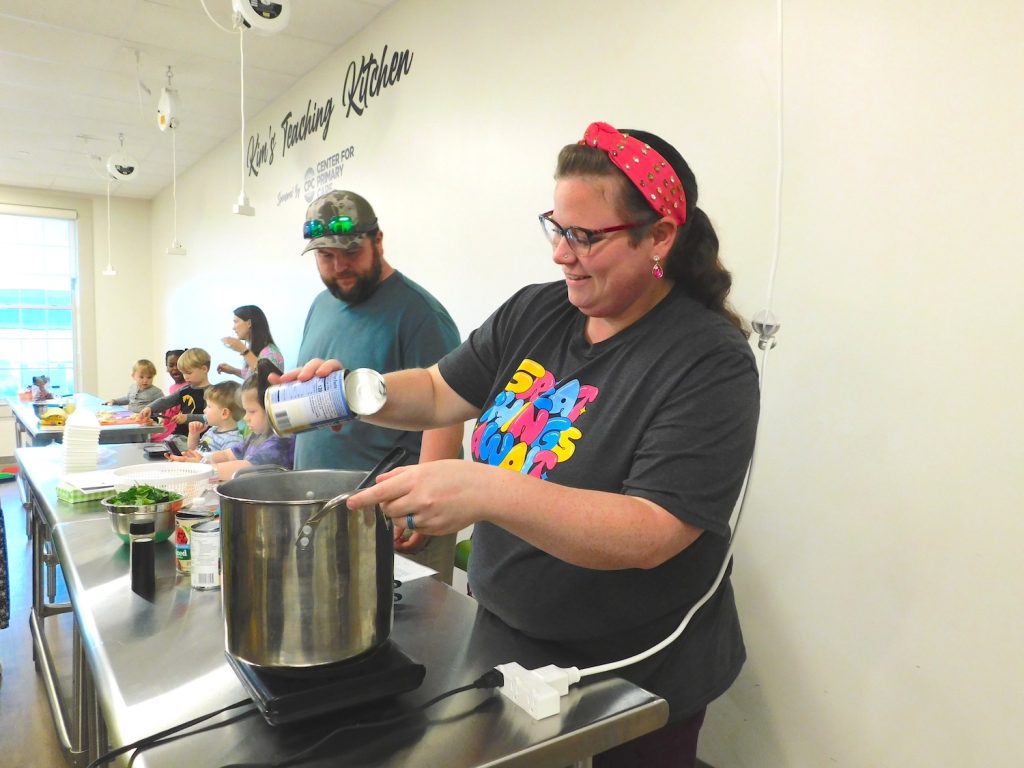
After her scare with postpartum preeclampsia in the emergency room, Chambers decided to enroll in the Food is Medicine program.
“When they told me about this program and asked if I wanted to enroll, I was like, ‘Of course. Why not? You saved my life. I can definitely come be a part of the program to help take care of myself and my body with healthy eating,’” Chambers said. “I bring my entire family, and we learn about how to prepare fresh foods like zucchini and squash in healthy ways. My daughter helps me prepare the meals and my husband has been very supportive of eating better. We’ve become a healthier and happier family because of what we’ve learned here.”
Seeing happy mothers with their babies pushes both Vernon and Ray to continue to expand this comprehensive program at AU.
“I truly love and relish it when I walk into a patient’s room and immediately someone takes their baby and says, ‘Here. Do you want to hold my baby?’” Ray said, smiling. “I just sit there, and it’s almost hard to conduct business in a room, when I’m holding this precious little baby.
“It happened twice yesterday in the office, and I just sat there and enjoyed visiting with the mother and her new baby,” he added. “It is so good to see the fruits of our labor. We want that for every mother in Georgia.”
Discoveries at Augusta University are changing and improving the lives of people in Georgia and beyond. Your partnership and support are invaluable as we work to expand our impact.
 Augusta University
Augusta University
